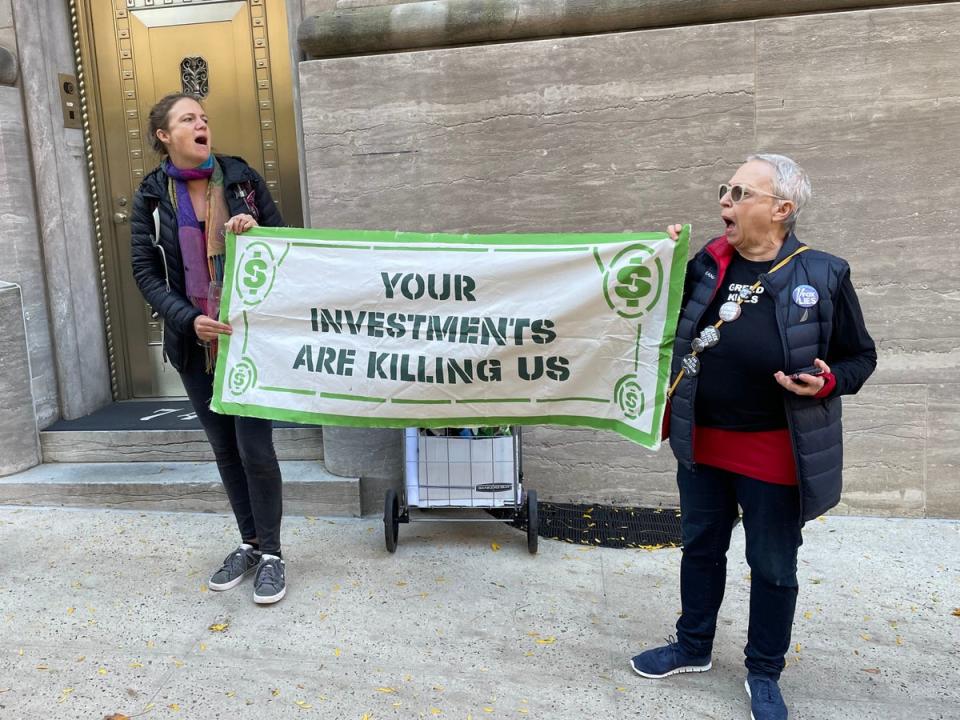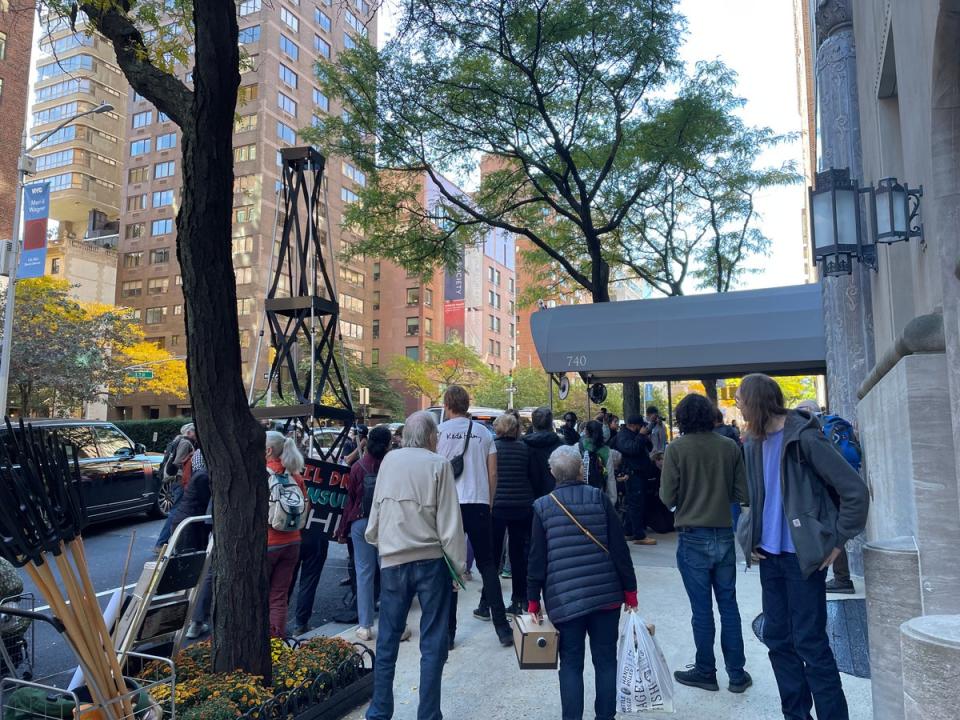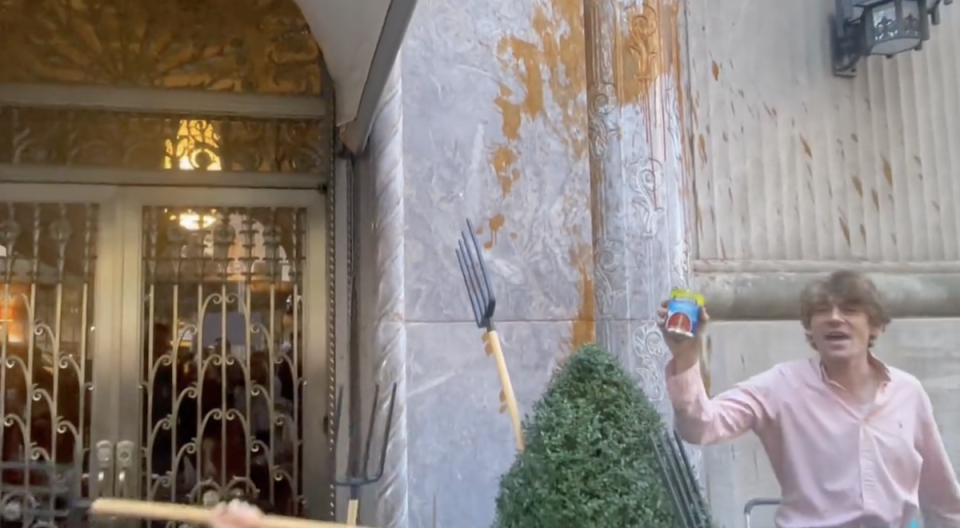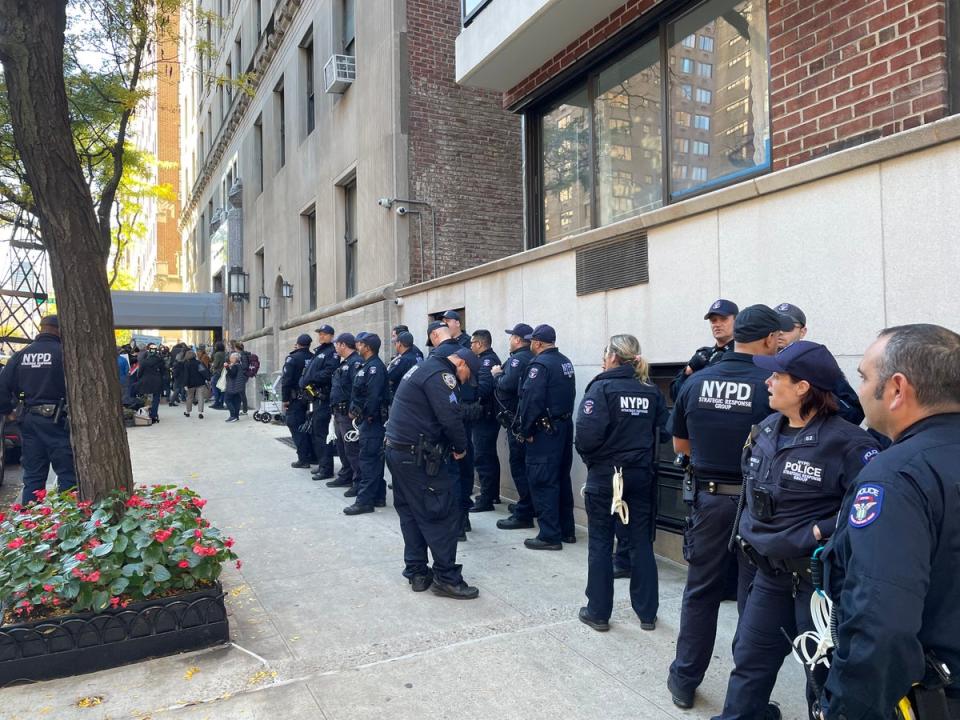Throwing soup and road blockades: ‘Tax the rich’ climate protests hit one of New York’s wealthiest areas
Climate activists brought the fight to some of New York City’s wealthiest residents this week as they shut down Park Avenue with soup-throwing, road blockades and replicas of oil towers.
On the Upper East Side of Manhattan, a ritzy enclave of investment bankers, celebrities like Madonna and the mayor’s mansion, the response to the protests ranged from supportive to antagonistic and confused.
“I just can’t believe they’re allowed to do this, it’s kind of fantastic,” Diana, who lives locally and asked for her surname not to be used, told The Independent.
Thursday’s demonstration, led by activist group New York Communities for Change (NYCC) and local chapters of the Sunrise Movement and Extinction Rebellion, took place outside the home of Stephen Schwarzman, CEO of investment firm Blackstone, which has invested heavily in fossil fuel companies. The groups were protesting what they say is the role of the ultra-wealthy in the climate crisis.
Tommy Fiore of Staten Island, a doorman who works at a neighbouring building, told The Independent that he believes the climate crisis is “all bulls***.”
“They need to get jobs,” he said of the protesters.
Another New Yorker, Dan, who asked not to use his last name, said that the climate crisis was “a huge problem” but didn’t know if targeting individuals was helpful.
“Sometimes, some of these protests, they feel they need to harm people in order to fix global issues,” he told The Independent.

Thursday’s protest involved an elaborate replica of an oil well and a zombie-themed mock meal with a tablecloth which read “If we tax the rich, maybe we won’t have to eat them.”
Two protesters also threw a can of tomato soup at Schwarzmann’s building, in an echo of a similar protest at a London gallery earlier this month where protestors threw soup on a glass-covered Van Gogh painting.
Activists held banners with slogans like “Your investments are killing us” and “Climate chaos continues 10 years after Sandy,” in reference to Superstorm Sandy, which hit New York City ten years ago on Saturday.
Sandy wreaked unprecedented damage to New York City, along with large parts of the state and New Jersey. More than 200 people were killed in the storm including 44 New Yorkers.
Many of those who spoke with The Independent on Thursday had lived in the city during Sandy.
“It was very scary, and we have friends that live way downtown that got flooded out,” said Diana.
One protester, Laura Beckman of Brooklyn, told The Independent that some of the people in her activist group are from the Rockaways neighbourhood in Queens, which was one of the hardest hit areas during Sandy.
Some of these people “still have trauma from what happened 10 years ago and always have go-bags prepared in case of a flood,” Ms Beckman said.
“There’s still not enough that has changed in terms of climate resilience and justice for frontline communities,” she added.

In addition to targeting Mr Schwarzman, the protest leaders had a message for New York Governor Kathy Hochul.
“We’re also here with our platform to call on Governor Kathy Hochul, who has the power to tax the rich here to pay for green housing for all,” Alice Hu, a climate campaigner with NYCC, told The Independent.
“Green housing” refers to the concept of homes and apartments that have a lower carbon footprint through the use of renewable energy sources such as solar panels and electric heat pumps.

In addition to facing down the effects of the climate crisis with storms like Sandy — or Ida, which flooded much of the city last summer and killed more than 40 people in New York and New Jersey — the area is in a serious housing crunch. Rents in New York City this summer hit all-time highs, the Wall Street Journal reported, with little relief in sight.
After setting up their oil tower and zombie-themed table, some of the protesters briefly shut down southbound lanes of Park Avenue as police were gathering. Shortly after noon, eight people had been arrested and the protest dispersed.
Another protest this week occupied the headquarters of the investment firm BlackRock to protest their investment in fossil fuels. Activists on Monday also interrupted a taping of The View with Texas Senator Ted Cruz to condemn Mr Cruz and ABC’s coverage of the climate crisis.
“We believe that now is the moment, I mean — in fact, yesterday was the moment — to have direct action around the world to really create a spectacle and have people wake up to the true extent of the climate crisis,” Ms Hu said.

She added that the soup-throwing protest in London earlier this month sparked international conversation around climate in a way that other demonstrations haven’t.
“For anybody who thinks, ‘I agreed with their message, but you know, what did Van Gogh have to do with it?’ — well, we’re here throwing tomato soup at Stephen Schwarzman’s house because he, more so than most of the other people in the world is responsible for the climate crisis,” Ms Hu said.
The Independent has contacted a representative from Blackstone for comment.
While many locals understood the challenges of the climate crisis, some challenged the method of protesting outside Mr Schwarzman’s home.
“I don’t buy oil companies because I don’t want to favour them, but I would not boycott them,” one resident, Jean-Noel, told The Independent. “If Schwarzman thinks it’s a good investment for his fund, that’s his problem.”
But mostly, denizens of the country’s largest city are used to the spectacle of protests like this.
“It’s normal,” Kimberly Holliday, one local who was passing by the demonstration told The Independent. “Normal New York things going on.”

